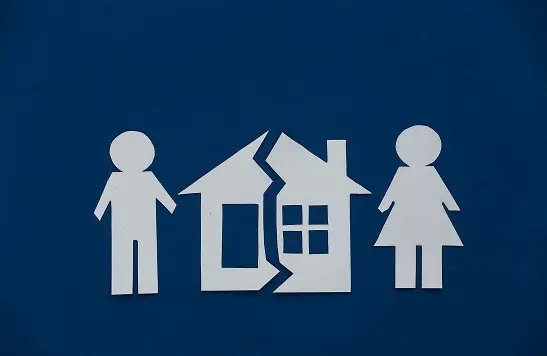AN ELEPHANT IN THE LIVING ROOM
When a couple go their separate ways, difficult topics come up - emotionally and financially.
Who gets custody of the children? How should the assets be distributed fairly? Dealing with the family home or jointly owned property is a particular challenge. Let's take a look at property ownership in the event of divorce.
Divorce happens more often than many people think: around 16,000 couples get divorced in Switzerland every year. The risk of divorce is apparently highest in the first few years: Over 20 per cent of marriages do not last longer than five years. In around 40 per cent of cases, the couple go their separate ways again after ten years at the latest.
In each individual case, it is undoubtedly emotions that determine processes and behaviour. Even catchphrases such as "hope dies last" don't help.
People going through a break-up often experience a rollercoaster of emotions - anger and disappointment or perhaps hope that they can still find a common path and overcome the crisis.
In addition to everything else, there are also legal and financial issues to deal with.
THE LEGAL GROUNDS FOR DIVORCE

Swiss divorce law emphasises the autonomy of the spouses. If, for example, both partners agree on the separation, this simplifies many things, even if not all the details of the household effects and assets are clear. With such a consensus, the couple is spared having to negotiate about guilt and responsibility with the help of lawyers. There is also no need to wash dirty linen in court and tell stories from their private lives.
The law essentially provides for three grounds for divorce (Art. 111 to 114 CC):
1. divorce on joint request:
A court will confirm the divorce if this is the declared wish of both partners. The prerequisites are that both partners confirm this at the court hearing and agree on a divorce convention (this document regulates all essential points, such as the division of household effects and assets, and the custody of children). The partners are free to draw up this important document themselves without outside assistance or to consult a lawyer or notary.
2. divorce on complaint:
This route must be taken if one partner opposes the divorce (Art. CC 114). Both parties have the option of enforcing the separation through a court - even against the will of the partner. The prerequisite for this is that the partners have lived apart (physically) for at least two years. No court judgement is required to dissolve the joint household and live separately.
3. divorce on grounds of unreasonableness:
In cases of hardship, the law also provides for a third option. If one spouse cannot reasonably be expected to wait out the two-year separation period, a divorce on grounds of unreasonableness is possible. However, this rarely occurs in practice (for example, in cases of physical, violent assault or similar).
GOODS: WHAT DOES PARTICIPATION IN THE ACHIEVEMENT MEAN?
The further procedure depends above all on which matrimonial property regime the marriage is subject to. Married couples can choose between participation in acquired property, community of property and, thirdly, separation of property: This is by far the most common variant in Switzerland. It always comes about if the spouses do not agree anything special (no marriage contract). Community of property: The jointly managed joint property comprises almost all of the marital assets. This also includes the joint income earned during the marriage. In addition, each partner has their own separate property (items for personal use such as clothes, jewellery, hobby items, etc.; this also includes assets brought into the marriage). Separation of property: This variant must also be regulated in a marriage contract. In somewhat simplified terms: income and assets are separated, so there are only the husband's and wife's assets. For the sake of simplicity, let's take a look at the division of property: In the event of a divorce, there is a property settlement. This means that the assets of both partners are divided into acquired property and personal property. The acquired property includes everything that the partner has acquired or "earned" during the years of marriage. This primarily includes income from gainful employment or social insurance benefits (AHV, BVG, ALV, etc.). Income from securities and, in particular, rental income from real estate are also considered to be part of the assets.
 "MY PROPERTY OR YOURS?Â"
Personal property includes everything that belonged to one partner before the marriage, including personal items such as clothes or jewellery. Inheritances or gifts during the marriage are also included. In the event of a divorce, each spouse is entitled by law to their own property and half of the other's proposal. The proposal consists of the inheritance minus any debts. However, we can tell you from years of experience that even if the legal provisions appear clear, conflicts arise time and again in practice. It is important to know that the burden of proof is on you. If you cannot clearly prove that an item or asset is to be regarded as your own property, it will be regarded as an inheritance. This can cause you considerable problems and disadvantages in the divorce battle. After all, in a long-standing marriage or partnership, it is not always clear in retrospect who is entitled to what. In the case of real estate and condominiums, the first step is to define the entries in the land register (co-ownership, sole ownership or joint ownership). In order to make provisions for all eventualities, it is worthwhile to clearly regulate and document things in advance in the case of properties. Otherwise, in the event of a divorce, it will be difficult to prove who has contributed how much equity and who has paid the interest and building maintenance. If the couple agree to keep the property for the time being, they must set out the essentials in writing and endeavour to divide the costs fairly. This involves deciding who will take care of maintenance, who will pay interest and amortisation and, where necessary, who will manage the property. If only one partner remains in the house, the question must be answered as to what costs and how the other partner will be compensated. The decisive factor is what happens to the house or shared flat in the long term. In many cases, home ownership is the largest item of joint assets. The two partners may be able to agree on a certain distribution formula. However, it often boils down to the property being divided between the two partners at its current market value. When it comes to a serious estimate of the value and the possibilities of a sale, we as estate agents can of course help you. We have extensive tools and possibilities to determine the value of your property. Please also refer to our next chapter "Valuation: What is the property really worth?" If neither spouse wants to take over the house after the divorce or can afford it financially, it is usually sold. Selling the property to a third party makes the division of assets easier. A sale and division of the proceeds require both parties to be entered in the land register as co-owners, which is quite common in the case of a joint ownership. Now everyone is entitled to their share according to the land register entry; in practice it is usually half each.
VALUATION OF THE PROPERTY

In today's environment, a fair market value assessment is particularly challenging. Market value means: What proceeds could be realised in the event of a sale? If the couple calls in an independent valuer, he or she bears a great deal of responsibility. For example, if he or she values the property 100,000 or 200,000 francs too low, one partner would penalise the other (the one who is paid out). There are usually two options for dissolving the co-ownership:
One partner takes over the property and pays out the other. However, the value should of course be clearly determined beforehand. We can help you with this!
In the case of divorce, however, the property often has to be sold and the proceeds divided up - quite simply for financial reasons. Often one partner alone is not in a position to bear all the costs for the house, mortgage interest, ancillary costs and amortisation. If the property is transferred from two co-owners to one partner, the bank must expressly agree to this. It also checks whether all guidelines, such as the financial viability of the loan, have been verified.
Experience shows that spouses going through a divorce are well advised to seek dialogue within the family. Secondly, pension assets (pension fund assets or 3rd pillar) can also be considered as a financial aid. If you can raise funds with one or other of these options, it may be possible to keep the house or condominium in the family after all. You should also consider the following option: if you want to keep the family property in the long term, you can transfer it to your children. How exactly and under what conditions the house could be transferred to the next generation would need to be clarified thoroughly (ask notaries or lawyers). In practice, it is not uncommon for properties to be transferred to direct descendants during their lifetime (as an advance inheritance or possibly as a gift).
PREVENTING DISPUTES WHEN BUYING A PROPERTY
The wedding is about to take place, the couple are on cloud nine, the purchase of the joint property has been finalised and the threshold to the new home is crossed full of happiness. Hardly anyone thinks about the possibility of divorce and the consequences that follow. In order to avoid disputes in the event of a separation, you should settle matters relating to property and asset relationships in advance. Ideally, you should conclude a marriage contract before the wedding and the purchase of your property, have the ownership shares entered in the land register and also ensure that your mortgage has clear and fair arrangements in the event of a divorce. You should also discuss what happens in the event of the death of a partner. In any case, keep all relevant receipts and documents relating to your property in a safe place in case disputes arise in the event of a divorce.
Would you like support with your property-related decisions in the event of a separation? Our property consultants at Wealth Investment Network AG can help you with many aspects. From the purchase of a property and contractual arrangements to property valuation and property sales, we are your competent partner. Simply get in touch with us or visit us at one of the WENET locations near you.

